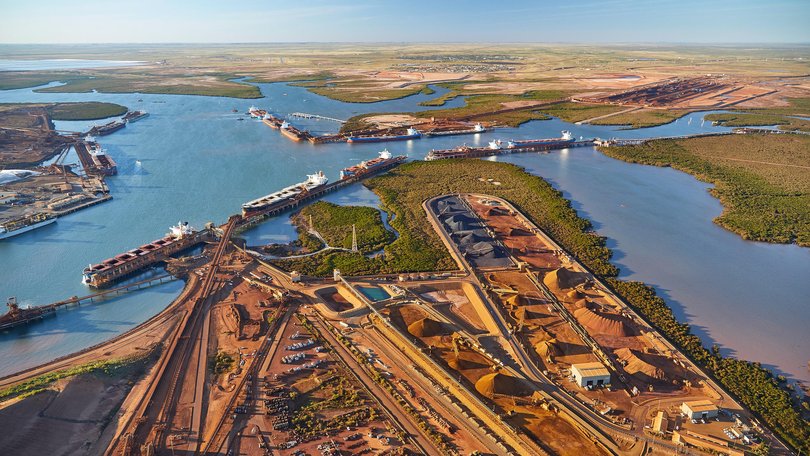BHP keeps shipping iron ore to China amid ‘temporary suspension’ but impact could take weeks to crystallise
Ships laden with BHP’s iron ore are continuing to set sail for China despite the global superpower’s supposed ban on the mining giant’s key export. But the champagne should stay on ice.

Ships laden with BHP’s iron ore are continuing to set sail for China despite the global superpower’s supposed ban on the mining giant’s key export.
But the Big Australian’s legion of local shareholders should keep the champagne on ice for now.
A BHP vessel carrying iron ore left Port Hedland this morning bound for the Chinese port city of Qingdao, and another vessel is scheduled to depart for China later today.
Sign up to The Nightly's newsletters.
Get the first look at the digital newspaper, curated daily stories and breaking headlines delivered to your inbox.
By continuing you agree to our Terms and Privacy Policy.All of the iron ore BHP mines in the Pilbara is shipped via Port Hedland, and it takes about two weeks for it to reach Chinese shores.
Reports emerged on Tuesday evening that Beijing’s state-run iron ore buyer — China Mineral Resources Group — had asked domestic traders to temporarily stop purchasing any WA cargoes from BHP.
The ban apparently stems from a dispute over how much the CMRG is willing to pay for a sought-after iron ore product from BHP’s Jimblebar mine which lies 40km east of Newman.
Industry insiders told The Nightly the latest shipments would be for orders predating the ban, and if there is any impact on BHP’s export numbers it should take at least two weeks to become apparent.
In a stroke of good fortune for BHP, sources have said the miner was scheduled to undertake higher-than-usual port maintenance during October. This puts a cap on the amount of iron ore it is able to export for the month.
It’s not known exactly how much of BHP’s iron ore is contracted to CMRG, though analysts at Macquarie reckon term contracts already struck with steel mills would not be impacted by the ban. The bulk, about 80 per cent, of BHP’s shipments are bound for China.
Pilbara Ports Authority keeps tabs of all volumes being shipped by the big iron ore miners through the export gateway.
Shipments for the week show there was a bumper haul last Wednesday when more than 2 million tonnes were sent to sea, though that also includes shipments from the likes of Rio Tinto and Fortescue. On Tuesday, when Bloomberg first reported the purported buying ban, volumes were just over 1.2mt.
Shares in BHP, which lost 2.5 per cent on Wednesday, had rebounded 1.7 per cent by 12.15pm on Thursday. The benchmark price of iron ore was flat overnight at $US103.65 a tonne.
Prime Minister Anthony Albanese and Premier Roger Cook have been roped into the stand-off given iron ore is Australia’s largest export and cash cow.
Iron ore exports of about 892mt from WA were worth about $115.2 billion in the 12 months to June 2025.
“Well, I am concerned about (the report),” Mr Albanese said on Wednesday.
“I want to see Australian iron ore be able to be exported into China without hindrance. That is important. It makes a major contribution to China’s economy, but also to Australia’s.”
BHP is the second-largest exporter of iron ore in Australia, with 290mt shipped by the company during the 2025 financial year. BHP has declined to publicly weigh in on the dispute other than to say it does not comment on “commercial negotiations”.
China, the world’s largest iron ore consumer, buys about 75 per cent of global seaborne iron ore and established CMRG three years ago to buy ore on behalf of its steelmakers in a bid to gain more leverage as a monopolistic buyer by keeping a lid on prices.
The Middle Kingdom has grown more willing to leverage its clout in trade during recent years, and has previously introduced since-lifted bans on Australian wine and beef.
